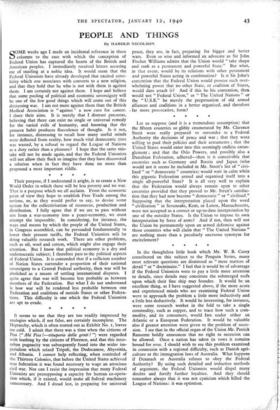It seems to me that they are too readily impressed
by analogies which, if not false, are certainly incomplete. The Heptarchy, which is often trotted out as Exhibit No. i, leaves me cold. I admit that there was a time when the citizens of Pisa ("Ahi Pisa I—vituperio Belle genti I ") were regarded with loathing by the citizens of Florence, and that this inter- urban pugnacity was subsequently fused into the wider im- perialism which seized Tripoli, the Dodecanese, Abyssinia, and Albania. I cannot help reflecting, when reminded of the Thirteen Colonies, that before the United States achieved true federation it was found necessary to wage an atrocious civil war. Nor can I resist the impression that many Federal Unionists are presupposing a capacity for human co-opera- tion which, if it existed, would make all federal machinery unnecessary. And I dread lest, in preparing for universal peace, they are, in fact, preparing for bigger and better wars. Even so wise and informed an advocate as Sir John Fischer Williams admits that the Union would " take shape and rank as a permanent and powerful State." But what, in that event, would be its relations with other permanent and powerful States acting in combination? Is it Sir John's contention that the Federal Union would possess such over- whelming power that no other State, or coalition of States, would dare attack it? And if this be his contention, then would not " Federal Union," or " The United Nations " or the " U.S.E." be merely the perpetuation of old armed alliances and coalitions in a better organised, and therefore - far more provocative, form?


































 Previous page
Previous page